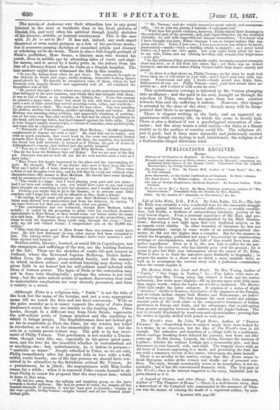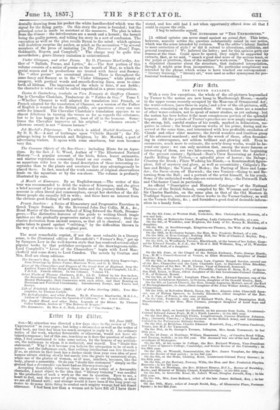PUBLICATIONS RECEIVED.
History of Civilization in England. By Henry Thomas Buckle. Volume I. Memoirs and Adventures of Felice Orsini, written by Himself; containing un
published State Papers of the Roman Court. Translated from the original Manuscripts, by George Carbonel.
The Professor : a Tale. By Currer Bell, Author of "Jane Eyre," &v., &c. In two volumes.
Anne Sherwood ; or the Social Institutions of England. In three volumes. The Dead Secret. By Wilkie Collins. In two volumes.
The Life of George Stephenson, Railway Engineer. By Samuel Smiles. With Portrait.
To Be or not to Re? a Novel. By Hans Christian Andersen, Author of The Improvisatore." Translated from the Danish, by Mrs. Bushby. Icicles. By the Author of" Gabrielle, or The Sisters," &c. he.
Life of John Sitio D.D., F.S.A. By John Eadie, LL.D.—The late Dr. Kitto was certainly a very wonderful man for the successful struggle he made against internal and external difficulties,—a weakly constitution, bad health, a deafness of extraordinary intensity, poverty of the -very lowest degree. From a personal experience of the East, and probably from natural liking, he was distinguished by his Bible Illustrations; throwing a new light upon that very hacknied subject, so far as regards vivid vitality. In other branches of literature he was not so distinguished; except in some works of an autobiographical character, he did not rise higher than a compiler. But for the manner in which his biography, published last year,* was overlaid by uninteresting writings or correspondence, another Life of him would have been altogether superfluous. Even as it is, the new Life is rather for the purchaser than the reviewer, who lass already gone over the ground ; for it seems to give but little new information about the career of Dr. Kitt°. What it does is to limit the narrative more distinctly to biography ; to present the matter in a closer and we think a more readable style as well as to accompany -the curious story with a judicious commentary when the events require it.
The Moslem Noble his _Land and People. By Mrs. Young, Author of " Cutch," "Our damp in Turkey," &c.—Few ladies write more attractively than Mrs. Young when her subject is fresh and the matter informing ; few write more slightly—fill up greater space with little more than empty words—when the topics are trivial or hacknied. The Moslem _nide falls under the latter category. It consists of a series of alight " sketches " chiefly in Bombay, descriptive of the manners of the Passim, and of certain Indian classes both Ilindoo and Malsometan ; an individual serving as a type. The best because the most useful and substanstantial parts of the book relate to the comparative treatment of Indian gentlemen in Europe and India, and the advantages that would spring from greater sympathy between the natives and the Anglo-Indians. The text is cleverly illustrated by wood-cuts and coloured plates; proving that the writer is equally skilled with pencil as with pen.
The World's Own. By Julia Ward Howe, Author of "Passion Flowers," &c.—Something fresh in subject might have been looked for in a drama by an American, but the idea of The World's Own is old enough. The seduction and desertion of a village belle by anobleman whose carriage breaking down delayed his journey, was worn out fifty years ago. In this drama, Leonora the victim, becomes the mistress of a prince; deludes the seducer Lothlir into a treasonable plot; and then denounces to ruin himself, wife, and child. The tragedy closes with an old lover of Leonora appearing in a mask, and presenting the frail fair one with a summary review of her career, whereupon she stabs herself.
There is no novelty in the matter, except that Mrs. Howe seems to think European nobles strike women and shuffle out of personal conflicts. The style, though occasionally warm in its description, is not remarkable; but it has the conventional dramatic trick. The best part of The World's Own is the interest imparted to the story, hacknied and in parts absurd as it is.
A _Legend of Glencoe, and other Poems. By the Bev. John Anderson, Author of "The Pleasure of Home."—There is a well-known story' that a descendant of -the Campbell who commanded at the massacre of Glencoe was the mean,s of causing the death of a reprieved soldier, by =i dentally drawing from his pocket the white handkerchief which was the signal for the firing party. On this story the poem is founded; but the principal actor is made an assistant at the massacre. The plan is taken from the Giaour : the interlocutors are a monk and a hermit; the hermit being the guilty person, and telling his story in a sort of confession. The execution as well as the plan recalls Byron to the mind : which opinion will doubtless surprise the author, as much as the accusation "by several members of the press of imitating [in The Pleasures of Home] Pope, Goldsmith, Rogers; and CampbelL" The charge may be quite true nevertheless ; grave literary imitation is unintentional.
Under Glimpses, and other Poems. By D. Florence MacCarthy, Author of "Ballads, Poems, and Lyrics," &c.—The first portion of this volume consists of a series of poems on the month of May, in which the genial season and its productions are treated with fancy and fluency. The "other poems" are occasional pieces. There is throughout the same fancy and fluency as in the "Under Glimpses," while plenty of imagery, with poetical words and smooth-flowing lines, seem to come forth ad libitum. The impression of the whole is feint, if not feeble ; the character is what would be called superficial in a prose composition.
Conies de Cantorberg, traduits en Vers Francais de Geoffrey Chaucer. Par le Chevalier Chatelain, Tradueteur de "Fables de Gay." Tome I. —Whether Chaucer is well adapted for translation into French, or French adapted for the translation of Chaucer, or a version of the Father of English is wanted by the British public, are questions every one can settle for himself. The Chevalier Chatelain's translation appears to us almost felicitous in turning the verses so far as regards the substance, but to be less happy in the poetry, least of all in the humour. Sometimes the Chevalier improves on his original ; " sehoures swoote " (showers sweet) is not "deuces larmes."
Job Morbid's Pilgrimage. To which is added Morbid Sentiment, 4c. By D. R. M.—A sort of burlesque upon " Childe Harold"; the Pilgrimage being to Greenwich and Brighton, by Mr. Morbid, a poet of advertising traders. It opens with some smartness, but soon becomes very flat.
The Common Objects of the Sea-Shore; including Hints for an Aquarium. By the Rev. J. G. Wood, Author of "The Illustrated Natural History.' —A popular account of the birds, fishes, lesser animantia, and marine vegetation commonly found on our coasts. The hints for an aquarium refer less to the usual description of those interesting receptacles than to the plants and creatures that may advantageously be placed there. In fact, much of the work consists of original observations
made on the aquarium or by the sea-shore. The volume is profusely illustrated by cuts.
A Month at Kissengen. By an Englishwoman.—The writer of this tour was recommended to drink the waters of Kissengen, and she gives a brief account of her sojourn at the baths and the journey thither. The account is often literal and commonplace, except her sketches of the different people she casually fell in with ; and these have an interest from the obvious good feeling of both parties.
Praxis Iambiea : a Series of Elementary and Progressive Exercises in Greek Tragic Senarii. By the Reverend John Day Collis, M.A., &e., Head Master of the Grammar School of King Edward the Sixth, Broomsgrove.—The diatinctive features of this guide to writing Greek tragic iambics are the gradually progressive nature of the exercises ; their exclusive derivation from ancient sources, so that all is classical ; and the pains taken to guard against "cribbing," by the difficulties thrown in the way of a reference to the original poet.
The most remarkable reprint, if not the most valuable in a literary sense, is the illustrated edition of Bloomfield's " Farmer's Boy," got up by Sampson Low in the well-known style that has rendered several other popular books by that publisher occupants of the drawingroom-table. Lord Campbell's Lives of the Chancellors" begin with Lord Macclesfield and come down to Lord Camden. The novels by Grattan and Mrs. Hall are cheap editions.
The Farmer's Boy. By Robert Bloomfield. Illustrated with thirty Engravings, from Drawings by Birket Foster, Harrison Weir, and G. E. Hicks. Lire, of the Chancellors and Keepers of the Great Seal of England, from the Earliest Times till the Reign of King George IV. By Lord Campbell, LL.D., F.B.S.E. Fourth edition. In ten volumes. Volume VI.
Select Works of Thomas Chalmers, D.D., LL.D. Edited by his Son-in-law, the Reverend William Hanna, LL.D. Volume XII. Sketches of Moral and Mental Philosophy, their Connexion with each other, and their Bearing on Doctrinal and Practical Christianity. Introductory Essays, and Tracts and Essays.
Life of Friedrich Schiller (1825). Life of John Sterling (1851). Two Biographies, by Thomas Carlyle.
The Bell-Founder, and other Poems. By D. Florence MacCarthy, Author of "Dramas from the Spanish of Calderon," Ite. A new edition. The Forfeit Hand, and other Tales. Legends of the Rhine. By Thomas Colley Grattan, Author of "The Heiress of Bruges."
Be Buccaneer. By Mrs, S. C. Hall, Author of "The Outlaw," &c.



























 Previous page
Previous page